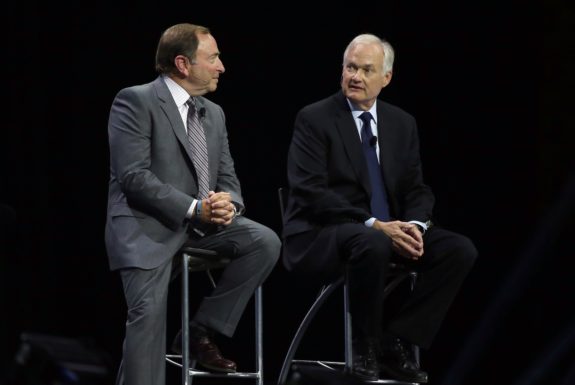NHL player salaries haven’t always been public. Back in the day, contracts were kept secret even amongst teammates. But with the rise of the internet, social media, and websites like CapFriendly, it doesn’t take long for new contract details to spread like wildfire to the public.
The league is also the healthiest it’s ever been, with the salary cap and contract values rising steadily since the introduction of the cap after the 2004-05 NHL lockout. With the constant headlines reporting new extensions and record-setting deals, we wanted to shed some light on how NHL players actually get paid and how much they end up taking home.
How Do NHL Players Get Paid?
NHL players, as employees, are paid semi-monthly, similar to most of the working world. They have their paychecks directly deposited into their bank accounts at the middle and the end of the month. The only major difference is that their pay period only spans the regular season (October – April), typically receiving 13 paychecks.
Take Home Pay
When you read a tweet that a player signed for $2 million per year, a lot of us jump to the conclusion that they will actually receive this amount. In reality, they’ll be lucky to see half of that, depending on where they play. There are two main factors that leave the player with a lot less: Escrow and Taxes.
NOTE: NHL Players are paid very handsomely during their playing years, and if managed properly can live a very comfortable lifestyle. This article offers a closer look at how much players are actually making and isn’t a sob story for players making millions playing the game they love.
Escrow

The CBA, negotiated between players and owners, states that “Hockey Related Revenue” must be split 50/50. So how do owners make sure that they are receiving their fair share in order to cover the expenses of running an NHL team? Escrow. Learn more about the inner workings of escrow.
The escrow rate has decreased over the past couple years and is set at 11.5%. This means, on a $2 million annual salary, the player will have $230,000 deducted from their paychecks over the course of the year (not including any escrow refund they may get back).
Taxes for NHL Players
Next up is taxes. They are an NHL player’s biggest expense over their career and while all employees in North America are subject to income tax when you look at the actual dollar figure and not just the percentage, the amounts are astronomical.
The amount a player pays in taxes depends on what team they play for and where they reside. If you play for the Toronto Maple Leafs or the Montreal Canadiens you are in the 53% tax bracket! But if you play for one of the teams in Florida, Texas, or Nevada where there is no state tax, you are only in a 37% tax bracket.
(This is a very simplified model. In reality, players must pay taxes in each state or province in which they play during a season which will change their overall tax rate. Players from Canadian teams are also paid in US dollars and therefore the exchange rate comes in to play).
If we use the same $2 million salary example, after escrow we get the following:
Toronto: $1,770,000 X 53.5% = $946,950 in taxes
Dallas: $1,770,000 X 37% = $654,900 in taxes
That is a lot of tax to be paid!
Other
Finally, an NHL player has other expenses to pay outside of standard living expenses:
- Agent fees ranging from 3-5%.
- Summer training costs to maintain their elite fitness and talent levels.
- NHLPA Union dues.
- Etc.
Conclusion
When you hear about players signing new contracts and think wow, it must be nice to get $3 million per year to play the sport you love, you’re right. NHL players and other professional athletes have nothing to complain about as all individuals have to pay taxes and have expenses.

But, if you take a closer look at what a player actually brings home, a $2 million salary on a team in a high tax bracket quickly becomes less than $830,000. But, again, that’s a number that almost anyone would be content with.